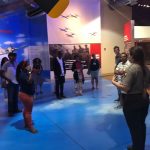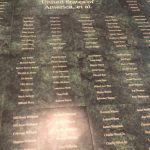Blog Blog Day 1 – June 25, 2018 Blog Day 2 – June 26, 2018 Blog Day 3 – June 27, 2018 Blog Day 4 – June 28, 2018 Blog Day 5 – June 29, 2018 Blog Day 6 – June 30, 2018 Blog Day 7 – July 1, 2018 Blog Day 8 – July 2, Read More ...

ICRPS 2018 Summer Institute | Tuskegee, AL | June 24-July 07
"Social Justice, Rural and Natural Resource Policy"
By Kara Woods and Emily Piontek
We started the second day of the conference by learning about different research methods. Going from general to specific, we discussed the universal linguistic relationships found in classifying natural observations within ethnoscience: taxonomy, patronomy, and queuing. After, more specific research methods were taught during breakout sessions. Sessions about Quasi Experimental Dialogue, Community Based Organizations, Data Sets and Key Informant Interviews introduced both qualitative and quantitative methods which help organize as well as analyze data. An important takeaway from the morning session was how much your specific research question directs the method used, questions asked, and informants interviewed. Another takeaway is the importance of united understanding when asking questions for research. During the session Robert Zabawa gave the example of finding farmers in West Africa that cultivated orange- fleshed sweet potatoes. Even though many farmers asserted they grew orange-fleshed sweet potatoes, none were found during farm visits. The conclusion was the different understanding of what the color orange entailed. When researching, common understanding and classification between researchers and research participants is imperative.
After lunch, ICRPS students and faculty members reconvened for an afternoon focused on the history of Tuskegee University itself, as well as the contextual history of racial injustice and inequality in the United States. Walter Hill of Tuskegee University presented on the history of land grant institutions such as Historically Black Colleges and Universities (HBCUs), and discussed the importance of continued advocacy for policies and funding that fairly support HBCUs. Jerry Pennick of the Federation of Southern Cooperatives presented on his work in developing relationships between community organizations and Tuskegee University. The Integrated Research & Extension program, which he administers, works to empower and support marginalized communities by connecting rural citizens to both resources and researchers at the university. Finally, Tuskegee archivist Dana Chandler discussed the impact made on Tuskegee University, and the scientific community at large, by George Washington Carver and his agricultural discoveries. Notably, Carver understood that “green agriculture”, or the use of agricultural products and processes to serve as energy sources, would one day supplant American dependence on oil.
ICRPS finished the afternoon with our first field trip away from campus. We rode through lush, verdant Alabama for a tour of the Tuskegee Airmen National Historic Site. The Tuskegee Airmen were the first African American members of the US Air Force, who overcame significant discrimination to become some of the finest fighter pilots of WWII. Their service paved the way for desegregation of the United States military. Our final stop was a visit to the Tuskegee Human and Civil Rights Multicultural Center. This museum portrays the US Public Health Service Study of Untreated Syphilis in the Male Negro, as well as the history of racial injustice in the United States. The US Public Health Service Study of Untreated Syphilis in the Male Negro, conducted between 1932-1972, was a federally sanctioned study in which hundreds of African American citizens were diagnosed with syphilis, yet left unaware of their condition. These men, never treated for the disease, were left to live untreated for the duration of their lives, even after a treatment for syphilis had been discovered. The presentations and field trip of the afternoon showed how far the United States has come in overcoming racial injustice, while emphasizing how much policy, development, and social justice work is left to be done.




Comments are closed.
Thank you for the great summaries of days one and two. I will be following the blogs regularly. Hello to all my friends in ICRPS. I wish I was there.
Tom Johnson
I wish I was there me too
Hello to ICRPS friendster